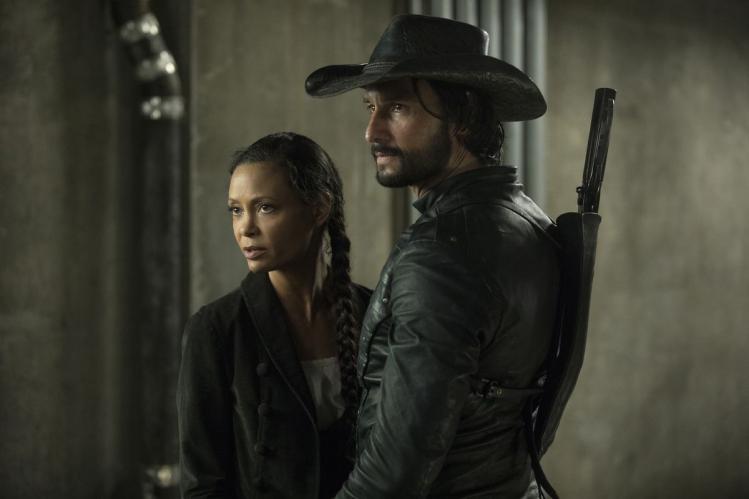
Philosophy and theology professors around the world are surely drafting syllabi based on Westworld, the HBO sci-fi epic about robots in a Wild West theme park. Now in its second season, the series brims with suspense and lurid thrills: saloon scenes, gunfights, the occasional scalping, tense evocations of futuristic corporate skullduggery. But the show stands out particularly for the metaphysical questions it raises: What makes us human? What does it mean to choose wrong over right? Is there such a thing as free will? In a world of artificial intelligence and computer-generated illusions, what divides the real from the unreal?
While echoing our ongoing angst about technology, the show often invites us to sympathize with the uncannily realistic androids who people Westworld, the eponymous frontier-style theme park. Human visitors (a.k.a. “guests”) can explore the park, which abounds in breathtaking canyons, picturesque homesteads, and bustling O.K. Corral–style towns. Guests can also abuse, kill, or otherwise interact with the resident androids (“hosts”), who include the beautiful rancher’s daughter Dolores (Evan Rachel Wood) and the savvy brothel madam Maeve (Thandie Newton). The park’s supervisors and staff—including the egoistic narrative-division bigwig Lee Sizemore (Simon Quarterman) and, initially, the programming specialist Bernard (the marvelous Jeffrey Wright)—maintain tight control of park activity. But a devious coder may have written secret behavioral rules for the hosts, who appear to be gaining consciousness and freedom.
Because the hosts’ memories are mostly fabrications, and because storylines in the park repeat, sometimes in variant form, when different guests make different choices, the Westworld narrative has a deliberately disorienting hall-of-mirrors quality. As bandits and hosts-gone-rogue execute grisly ambushes, and ranchers gallop around on horseback, time sometimes appears to be cyclical, and events turn out to be chimeras. The cannier or more elaborately programmed hosts—and even some of the apparent guests, like the sinister Man in Black (Ed Harris)—eventually realize that they are living in a gnostic reality: the ostensible universe is a fiction, and the truth has been revealed only to a select few. “There is a deeper level to this game,” the Man in Black announces confidently in one episode.
While the metaphysics of Westworld are intriguing and bold, the show’s twisty, Escher-print storytelling can get wearying. Moreover, viewers with a low tolerance for bloodletting should steer clear: even as the show seems to brood about consumers’ appetite for representations of brutality, it supplies us with a heaping portion of bloodshed.
“These violent delights have violent ends,” a rogue host mutters at one point, quoting a passage from Romeo and Juliet. The line—which recurs later—sounds like a mysterious prediction written into the park’s code. But for those of us watching Westworld, it might almost be a warning about the go-it-alone ethos and glorification of conflict that are part of the lore of the Wild West. The quotation has another reverberation too: given Westworld’s android-versus-human narrative and the Montague-versus-Capulet theme of Romeo and Juliet, the “violent delights” could refer to the gratification of an us-versus-them worldview—a mindset underlying the nationalism and xenophobia now visible around the world.
There is certainly no denying Westworld’s philosophical and social firepower. But can a TV show, or any kind of artwork, really grapple with the fundamentals of existence when it is completely lacking in humor? Superb TV series like The Wire and Breaking Bad have tackled heady social and moral issues while pausing now and then for comic relief. NBC’s ingenious, afterlife-themed The Good Place has even explored ethics and altruism in a half-hour comedy format.
But if you don’t count some gloomily wry moments—sometimes involving an incongruously jaunty player piano—Westworld is almost entirely solemn, to the point of ponderousness. The atmosphere of morose significance ultimately becomes oppressive. One longs, every once in a while, for the Man in Black to slip on a banana peel.


